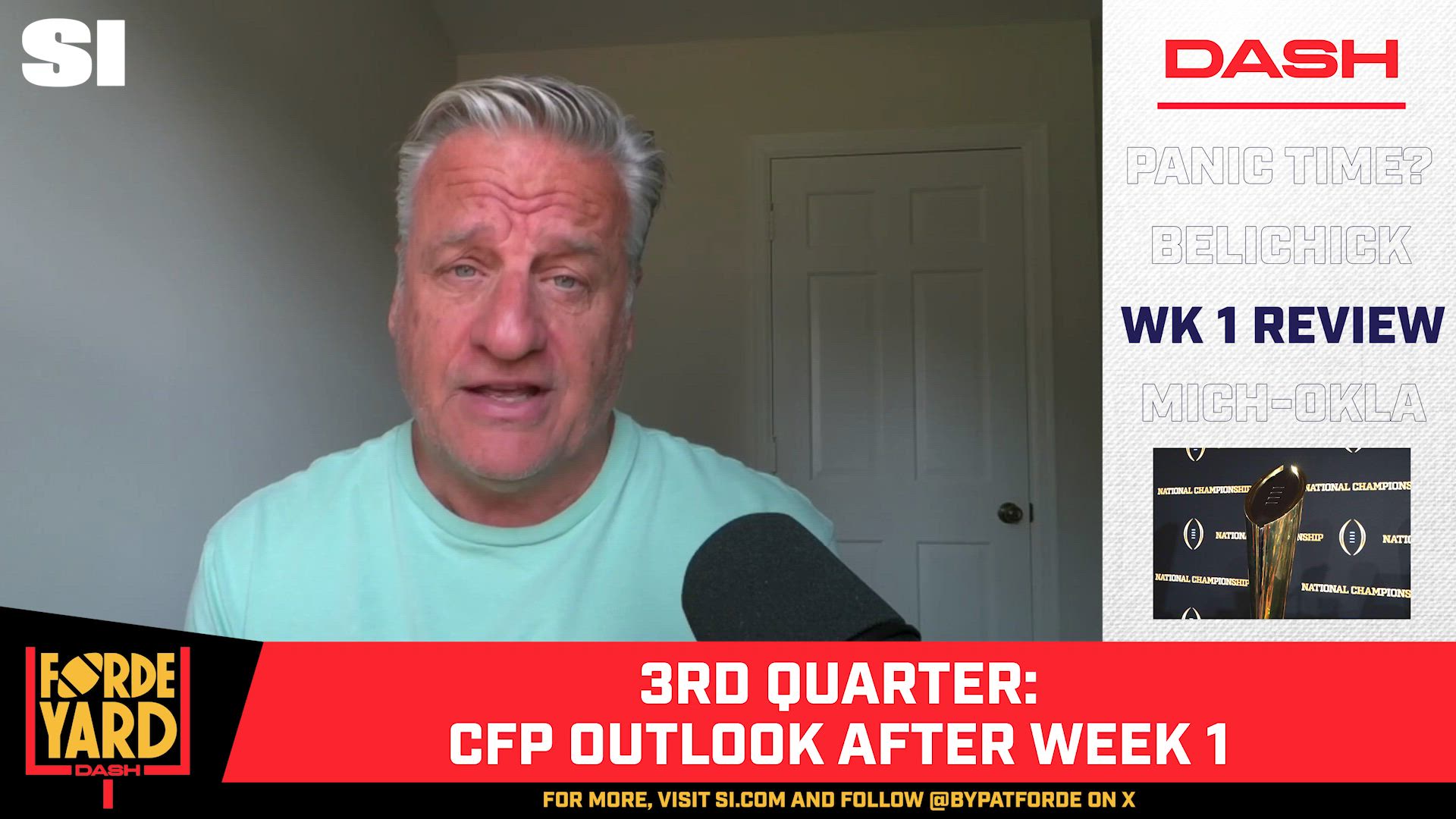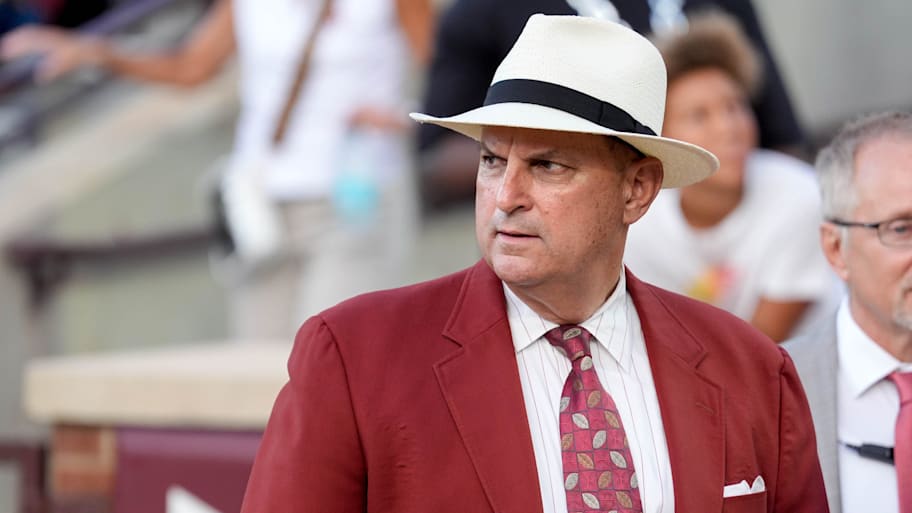There is no athletic director who is more well-versed in navigating the politics and peculiarities of an American college campus than Joe Castiglione. His entire adult life has been wired to the rhythms of a university academic calendar, having spent 45 years in athletic administration, the last 27 of them as the AD at Oklahoma. “Joe C,” as he’s known, is a very successful product of a very traditional system—and perhaps the last of his kind.
When the Sooners welcome Michigan on Saturday to the “Palace on the Prairie,” as Oklahoma’s Memorial Stadium is known, it will be the last major nonconference home game of Castiglione’s career. (“Took me 12 years and three different Michigan athletic directors to get the series done,” he cracks.) The search is on for the 67-year-old’s replacement, and it’s a near-certainty that his successor will come from a dramatically different background. A campus lifer will be replaced by someone who wouldn’t know the provost from a pipe-fitter.
“I don’t think there’s any illusion it’s going to be a conventional candidate pool,” says Jake Rosenberg, whose unconventional firm, The Athlete Group, is handling the search for the Sooners’ next AD.
Castiglione is fine with that. Having watched his profession shift—first gradually and now radically—is why he reached out in the first place last year to an industry disruptor in Rosenberg. That started a process that inadvertently led to The Athlete Group landing its first big AD search.
“Sometimes people have to realize they don’t have all the answers,” Castiglione says. “Doing things the same way we’ve always done it is not the right answer.”
Rosenberg is a former Philadelphia Eagles vice president who left the franchise in spring 2024 to open a boutique search firm and consulting service in college athletics. He says he’s not going back to the NFL—“I’ve burned the boats”—and instead is bringing an NFL business approach to the increasingly professionalized world of college sports.
Salary caps, contract negotiations, near-constant free agency—these are issues the pros have dealt with for time immemorial. Now that they’ve come to the college game, why not mine the ranks of pro executives or business people accustomed to those dynamics? And if that is going to be the new candidate pool, why not align with a search firm rooted in that terrain?
The first thing Rosenberg worked on in his new career was finding general managers for football programs—the new position of need in the post-House settlement, revenue-sharing era. College administrators could see this new dawn coming, so they started making plans.
Florida athletic director Scott Stricklin says he reached out to Florida alum and Eagles general manager Howie Roseman in the spring of 2024 for advice on hiring a GM.
“I did not need Billy Napier negotiating with kids,” Stricklin says. “The job is too big for one person to do it all. Billy could decide who he wanted, and then someone else negotiates it. Sharing millions of dollars is a lot different than offering a scholarship.”
Roseman suggested Stricklin call his former colleague Rosenberg. The two talked, and Rosenberg supplied a list of candidates. Florida landed on Nick Polk, who came to Gainesville, Fla., after 17 years in the Atlanta Falcons’ front office.
Around the same time, Castiglione was shopping for a department-wide GM. He learned that Rosenberg had just left the NFL, and he tried to recruit him for the job.
Rosenberg came to Norman, Okla., for an interview, but ultimately wasn’t ready to uproot his family—he has two teenage children. So Castiglione tried another angle: “What if we become your first client?”
The two worked to “build out the model,” in Castiglione’s words, for what a GM and personnel staff would entail. Among the decisions that were made, in conjunction with university president Joseph Harroz Jr., was to bring onboard former AT&T CEO and OU alum Randall Stephenson in a volunteer role last fall. His title: chair of football and special adviser to the president and the director of athletics.

Rosenberg recommended someone who was also part of his candidate pool for the Florida GM: Jim Nagy, executive director of the Senior Bowl, the premier scouting event for the NFL draft. Nagy, who had previously been an NFL scout for 17 years with four different franchises, was in a natural position of expertise when it came to evaluating prospects.
After a struggling first season in the SEC, going 6–7, the proud Sooners felt some urgency to shore up everything around head coach Brent Venables going into his fourth season on the job. Nagy was seen as crucial to that task, but it took some work for Oklahoma to seal the deal.
“We had some emissaries in Mobile last year [for the Senior Bowl] to get him thinking about Oklahoma,” Castiglione says. “That was a recruiting trip.”
By late February, Oklahoma landed its man. And then came the expansive support staff—two assistant GMs with NFL backgrounds, and four directors of personnel and/or scouting. Oklahoma vaulted from being arguably behind the SEC front-office curve to setting the standard.
“With the breadth and scope of making a huge transition, we think this will be the prototype for the future,” Castiglione says. “We decided as a university that instead of fighting change, or just responding to it, we should try to be more intentional about changing.”
The hiring of Nagy and his staff led to the next role for Rosenberg with Oklahoma—handling the search for Castiglione’s replacement, after his bombshell retirement announcement in July.
Stephenson heads the university search committee and is in regular contact with Rosenberg.
As with the GM move, this search will push the envelope. Rosenberg says the days of slow-playing the changes in college sports are over for smart athletic departments. Too many of them are wasting money or failing to maximize potential revenue streams, he asserts.
“There are probably more answers or more strategies than a lot of people are willing to actually use,” Rosenberg says. “People just want to chalk everything up to mass chaos and put their head between their own knees and assume crash position. I think our premise business-wise is that there actually are still a lot of ways to be smarter and be more strategic, and then you get paid back disproportionately because things are so inefficient.
“There’s so much change in college, I think we have the best chance to understand what these roles should look like because we’re doing actually the work and we’re on the ground. And I think those of us that have experience in professional ranks doesn’t translate exactly, but there are a lot of qualities about professional sports that are more of a part of college sports now.”
Importantly, Harroz is onboard with both the importance of athletics at Oklahoma as its SEC era begins, and this fundamentally different approach to it. For the longest time, the university had the proverbial alignment among its leadership: David Boren was president for 34 years, overlapping with most of Castiglione’s tenure and all of coach Bob Stoops’s. Harroz is an OU lifer himself, but there is a realization that 2025 is not 1995.
“We had to be comfortable stepping into an uncomfortable spot,” Castiglione says.
Joe C. will be in his comfort zone at The Palace on Saturday night. He is a natural talker, so greeting boosters and Michigan guests is in his wheelhouse.
This has been his life in Norman for more than a quarter century. As his profession and all of college sports change around him, the last of a dying breed of athletic directors will make his rounds for one final, big-time nonconference home game. Where Oklahoma goes for what likely will be a very different AD is a fascinating story that is still playing out.
More College Football on Sports Illustrated
Listen to SI’s new college sports podcast, Others Receiving Votes, below or on Apple and Spotify. Watch the show on SI’s YouTube channel.
This article was originally published on www.si.com as The Last College AD? Joe Castiglione’s Final Bow at Oklahoma Marks End of Old Guard.
